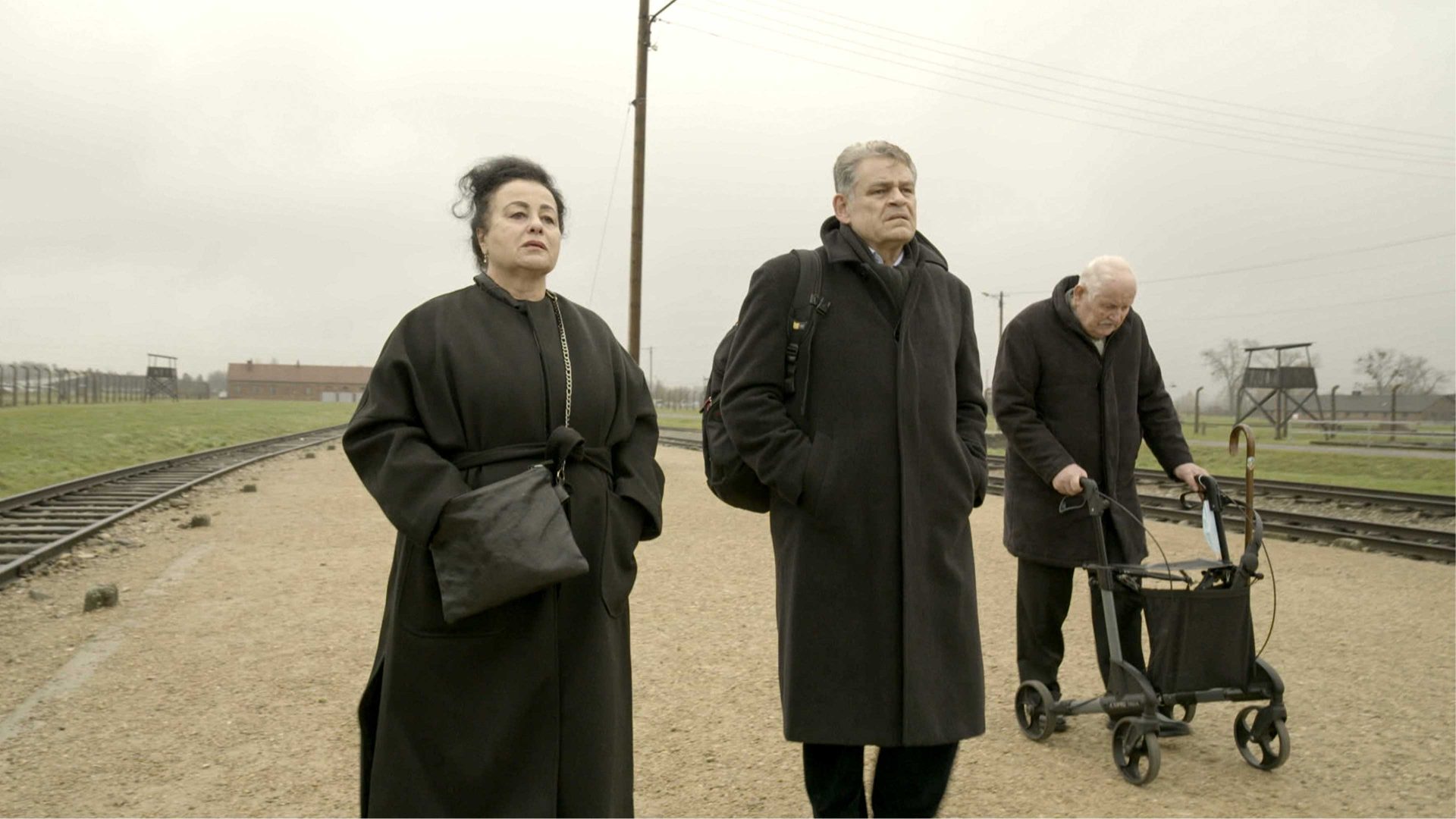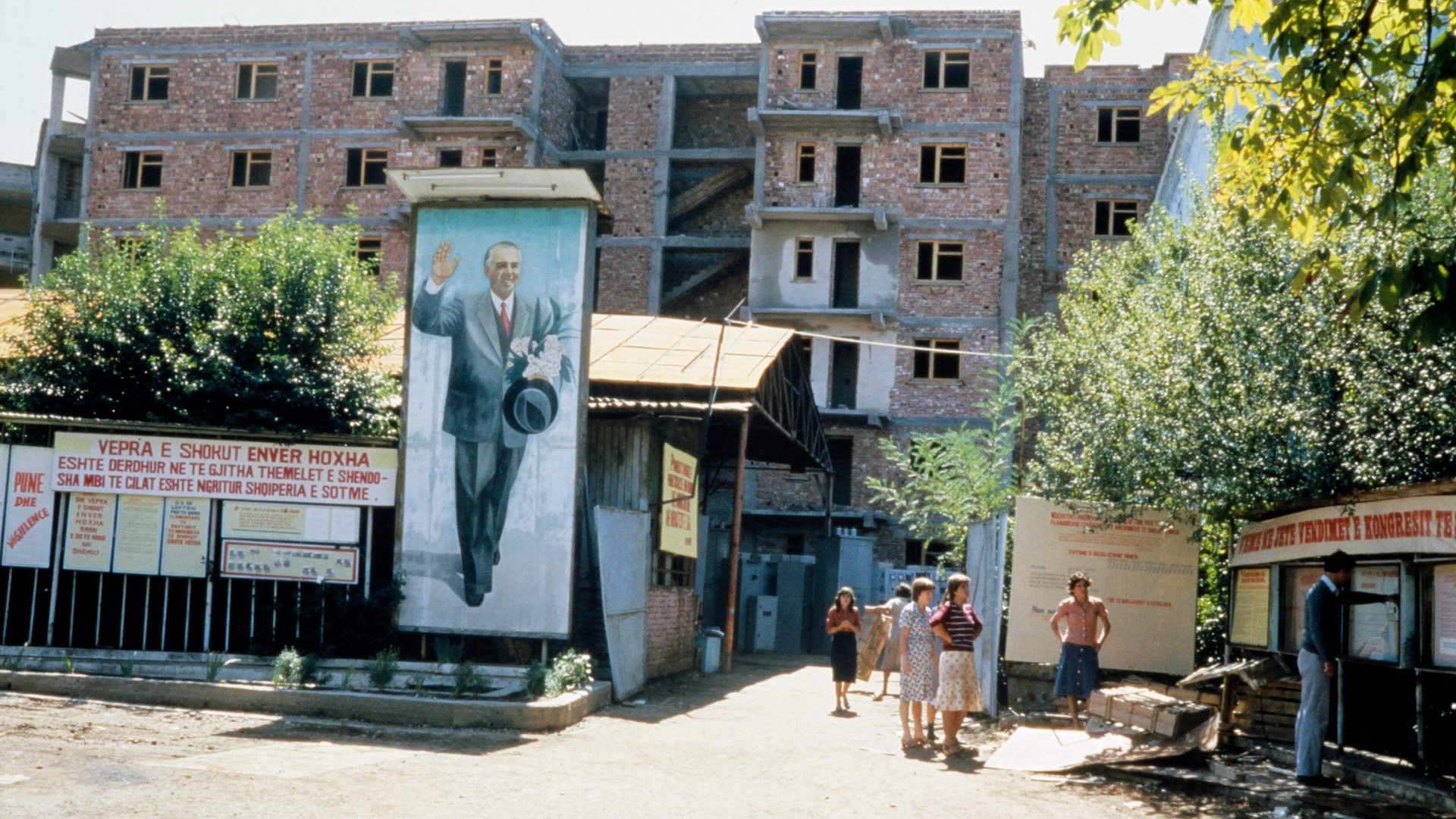“I had a lovely, idyllic childhood in Auschwitz…”
That sentence sounds so absurd it could come from a Mel Brooks comedy. You could see how it might even be funny in that context.
But coming from the mouth of an 87-year-old German man called Hans Jürgen Höss in this extraordinary new documentary, it chills the blood until it almost stops, frozen in your veins.
This man is the son of Rudolph Höss, the former commandant of Auschwitz, the man who ordered and masterminded the deaths of more than one million Jews and, as such, can lay claim to the title of greatest mass murderer in history. His son takes some sort of bewildered pride in the achievement.
If you saw the Bafta and Oscar-winning film The Zone of Interest by Jonathan Glazer, this man, now 87 but strong, healthy and coherent, was one of the children depicted playing in the garden and in the swimming pool. The snapshots from his family album shown here are immaculately reconstructed in Glazer’s film, along with happy scenes of birthday parties and family gatherings, including one of the little Höss beaming from the cockpit of a specially built miniature wooden fighter plane.
“We had everything, all the toys you could wish for,” he remembers.
The Commandant’s Shadow is so smartly constructed and so painfully honest that it could well match the awards success of The Zone of Interest. It takes Höss back to the home he lived in while his father organised the industrial death complex next door.
The house still stands, is still lived in – not by the Höss family, although it is still called (affectionately?) the Villa Höss – and much of it clearly remains as it was when this man was a little boy. Memories, fond memories of Christmas morning and sitting on his father’s knee, flood back. “The floor is the same,” he remarks, padding across the tiles.
I’ve never seen anything quite like The Commandant’s Shadow. Directed by Daniela Völker, it’s a film of remarkable moral courage, to ask the questions it does and to stare evil in the face with empathy. After all, did this man, who was an innocent child during the Holocaust, do anything wrong? It challenges notions about guilt and fathers and sons, the burden of history and the unreliability of memory.
Of course it’s about Nazis and antisemitism, too, and about what makes humans behave so awfully. And how they continue to explain that behaviour to themselves. And of course there have been other documentaries on the topic. I recall human rights lawyer and author Philippe Sands’ film My Nazi Legacy from 2015, with the sons of two Nazi administrators, Hans Frank, the Butcher of Poland, and Otto Wächter, who emptied Ukraine of its Jews.
But this film feels different, somehow more intimate and personal. Völker’s film leans on the autobiographical book The Commandant of Auschwitz, which Rudolph Höss wrote, or was ordered to write, while awaiting trial. “This book is filled with evil,” writes camp survivor Primo Levi in his introduction to the most recent edition. “It has no literary quality and reading it is agony. The author comes across as what he is: a coarse, stupid, arrogant, long-winded scoundrel. And yet… it is one of the most instructive books ever published.”
Hans Jürgen, it turns out, has never read his father’s book, indeed he says on camera that he’s never seen it, nor knew there was even a copy of it on the bookshelves in his home after the war. He reads a passage in which his father described the process of lining up the Jews for routine daily mass murder in the gas chambers. Völker asks him for his reaction. “I wish I hadn’t read it,” he says, shaking and hanging his head. “It’s dreadful.”
I meet Daniela Völker at the Jewish cultural centre JW3 in north London before going on stage to discuss the first UK screening of her film in front of a largely Jewish audience, many of whom will be descendants of survivors or will have their own connections to this material. We talk about their obsession with and emotions about the Holocaust, particularly amid the ongoing turbulence and traumas following Hamas’s incursion into Israel on October 7 and the continuing war in Gaza.
According to Völker, the Höss autobiography is a “sort of deathbed confession, a testimony straight from the perpetrator’s mouth”. She believes the book should be more of a tool in the fight against denial. “We can see how reading it moves even his own son to acknowledge something he has previously been able to ignore.”
But her film is also testament to how easily memory can shut down, obfuscate and switch into denial.
The film-makers went to Auschwitz to film the original handwritten manuscript, which has to be taken from a secure archive and can only be handled by the chief historian, using rubber gloves. “We have to show it, show that it exists,” she says.
Rudolph Höss himself does feature. We hear his rather weedy, high voice confessing to his own atrocities in recordings of the Nuremberg trials, and there is footage of him being hanged at the scene of those crimes, in Auschwitz, the place he designed and created with clinical coldness under Himmler’s orders. “It had been ordered and I had to execute it,” he writes.
Höss is such a monster that his shadow could easily dominate the film. And yet there is another key element here, that of Auschwitz survivor Anita Lasker-Wallfisch, an extraordinary woman 99 years of age who smokes 40 a day and lives in north-west London.
An accomplished musician from a well-to-do German Jewish family (her father held the Iron Cross for serving in the first world war), she was part of the orchestra that played in the camp as entertainment for the soldiers and to accompany the prisoners on their marches to work. After liberation she left for England and helped to found the English Chamber Orchestra. She is now well-known in survivor circles and has the most alarmingly matter-of-fact way of dealing with her own Holocaust trauma.
Early in the film, Hans Jürgen blankly denies ever seeing smoke or ashes or smelling the stench of burning bodies. But Lasker-Wallfisch looks right at the camera and states: “I saw it all with my own eyes. The black smoke, the horrible smell, it was hell on earth. We played, and hopefully the next day we were still alive. That’s how it was.”
Other testimonies from orchestra players who survived describe playing on some days when the smoke from the chimneys was so thick they couldn’t see the sheet music in front of them. That’s how memory works. Hans Jürgen may simply repress it, or not remember it, or have been protected from it by his mother and father, trained into ignoring it.
Lasker-Wallfisch tells how, when she came to England, nobody asked about Auschwitz, so she didn’t talk about it, even with her own family and children, for at least 50 years. The trauma appears to have passed on to her daughter, Maya, a trained psychotherapist who believes she has second-generation trauma, a documented phenomenon that feels tangible when you watch this film. “It is something in the hinterland, that sits within the psyche and which is given no words,” says Maya.
Remarkably, almost comically, her mother sits smoking and gives her daughter short shrift. “I’m the wrong mother for my daughter,” she admits. “Forget it! Get on with life.”
These are shocking words from a survivor – but then again, how could you survive Auschwitz without a certain level of hardening your soul to it, of blinkered self-preservation and a burning desire to be rid of the experience. “Playing the cello saved my life,” she says.
Sitting in her living room, or kitchen, even driving her car, fag in mouth, Lasker-Wallfisch is also heard loud and clear in a radio interview she gave to the BBC in 1945, an interview describing what happened every day inside the newly liberated camp. “We lined up and were told which way to march. Left is the chimney,” she says. “Right is life.”
Völker’s film, with its parallel stories of a perpetrator father and son, and a survivor mother and daughter – “you can’t have one without the other,” remarks the film-maker – heads to a historic meeting between Lasker-Wallfisch and Hans Jürgen.
Initially, the plan was to get Lasker-Wallfisch to return to Auschwitz to meet up with him there. But she refuses to travel, citing her age and health at first, but then stating firmly to her daughter: “Your Auschwitz is very different to my Auschwitz. Mine was about from one hour to the next not knowing you would be alive. I won’t go there.”
So Völker brings Höss to London. The brief scenes of him getting in a black cab and riding through the streets of Willesden to a suburban road reminded me of John Schlesinger’s Marathon Man, when Laurence Olivier’s character, Szell, is recognised by a couple of Holocaust survivors in Manhattan’s Diamond District.
Slightly less dramatic than the 1976 movie, of course, though no less emotionally powerful, is this meeting, over apple cake and coffee, between two people who, at certain times unbeknown to each other, may have been playing just 150 yards apart, she in the orchestra by the gate, he in the garden over the wall. “You never saw it,” she says to him now. “There was a fence between the horror and your real life.”
Völker tells me that this meeting, the climax of her film, was a heart-in-mouth moment, but that Lasker-Wallfisch’s plain-speaking diffused any tensions. “A meeting like this could be trite and, you know, people cry and beg for forgiveness,” she says. “But Anita was never going to let it play out like that. She was incredibly generous and courteous and gracious and she spoke German with him – the first time I’d heard her speak German at all – and they found a common cultural ground.
“For Hans Jürgen, I think it was life-changing. He was stunned by her. He was shaking like a leaf as he arrived and it’s a lot to take in for an old man, an overwhelming few days, reading his dad’s book and seeing Auschwitz, he was full of trepidation. So we witness him coming to terms with it all.”
There is so much more to tell of this film. The scenes of Höss travelling to America to meet his sister, Puppi, an ex-Balenciaga model, for the first time in over 55 years, are quite surreal, both of them retreating into childhood roles and games.
“We had a beautiful mother and father, didn’t we? He was a good person, wasn’t he?” I was immediately reminded of the famous Maysles brothers documentary Grey Gardens.
There’s so much more to tell of the Höss family, too. The mother, Hedwig (played so memorably by Sandra Hüller in The Zone of Interest), and her role after the war, and of Höss’s grandchild Rainer Höss, who doesn’t get a mention in this documentary because, frankly, he deserves a series of his own, having been sentenced for fraud on a number of occasions involving swindles on Holocaust survivors and false artefacts and tours of Auschwitz.
There’s a lot of Auschwitz about at the moment. Apart from The Zone of Interest, there has been the successful adaptation on Sky of The Tattooist of Auschwitz, starring Harvey Keitel and Jonah Hauer-King. A Real Pain is a Jesse Eisenberg movie co-starring Succession’s Kieran Culkin, about two mismatched cousins on a road trip through Poland to trace their grandmother’s roots.
And, currently on small UK release, there’s Treasure, a 1990s-set film with Stephen Fry and Lena Dunham as a camp survivor and his daughter, a New York writer, on a trip to Auschwitz and his old apartment.
Perhaps it’s the approaching anniversary of the camp’s liberation, or perhaps it is something more troubling, more normalising. Just Googling “Auschwitz” takes you down a rabbit hole of books and TV series using the name of the camp in all sorts of ways, all of them as a kind of shorthand for the many stories and experiences that took place behind its fences, from the point of view of both victims and perpetrators.
The name is now a shortcut to signify a nightmare but all of this, it seems to me, is taking us away from the real meaning of it as the largest and most notorious human extermination facility of all time, a death complex for eradicating the Jewish race.
You’d hope the words “never again” (on which Israel was founded and on which much Holocaust education is based and, in particular, much postwar German education) haven’t lost their meaning but they, too, are being used and weaponised against Jews worldwide as Israel continues its awful war on Gaza. And you’d hope that someone such as Anita Lasker-Wallfisch would have arrived at some wisdom in her experience.
Her brusqueness is admirable in many ways, a demeanour and delivery that basically says: of course I’m telling the truth, you think I’ve got time for bullshit?
“Of course it could happen again,” she says when asked. “We humans behave atrociously badly really. People need scapegoats and it’s the Jews again. This is the Jewish fate, not belonging anywhere. And where we should belong, that’s where is the biggest problem.”
The Commandant’s Shadow opens in UK cinemas on July 13




